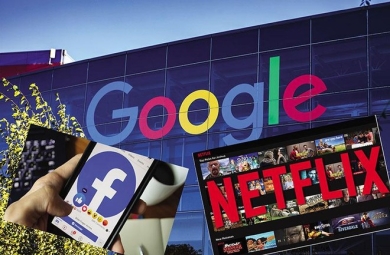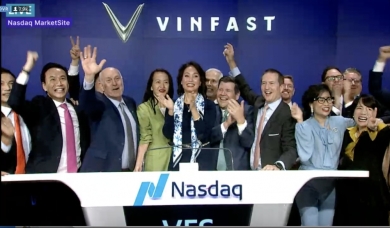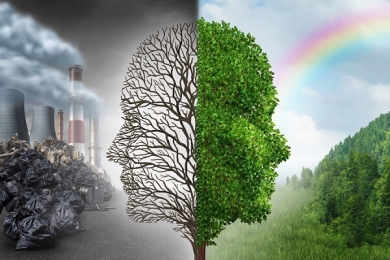An interview with Francis Fukuyama.

Noema Editor-in-Chief Nathan Gardels recently sat down with Francis Fukuyama at Stanford University for the Berggruen Institute’s upcoming “Paradigm Shift” podcast series. Fukuyama is the noted author of books such as “The End Of History And The Last Man,” “The Origins Of Political Order” and “Liberalism And Its Discontents.” What follows is an excerpt of their wide-ranging conversation.
Nathan Gardels: You said some years ago that democracy cannot survive the lack of belief in the possibility of impartial institutions. Today, that level of trust is almost zero and worsens daily with the continued denigration of the courts by the Trump team. Even Supreme Court Chief Justice John Roberts says such attacks are very dangerous to the rule of law. Where does the meter of democracy’s survival stand today?
Francis Fukuyama: Since Jan. 20, I place it much lower. There was much discussion before the election asking, “Is Trump a fascist?” Is he an authoritarian?” I tended to poo-poo some of that. Comparing him to Hitler, I felt, was just a little overheated. But now one must admit he’s definitely an authoritarian. In these short months, you’re already seeing America turn toward authoritarianism.
The Constitution is all about the separation of powers, boxing in the executive so that the president has very clear but limited duties. Yet, what we’ve seen since Jan. 20 is a barrage of executive orders. It’s like the king is simply giving out commands to his subjects.
Under this administration, you don’t go to Congress to debate legislation. If you want to change something, like closing down a major agency, you petition the king. So, we’re already in an authoritarian phase. That’s just on an institutional level.
The other really poisonous thing that’s happening is the further erosion of trust. I had always thought of America as a relatively high-trust society. This is a tradition that goes back to Alexis de Tocqueville, the idea that Americans get along and can form civil society organizations to cooperate with each other. But that level of trust has disappeared along with trust in government, which itself was never high to begin with, but now has turned very poisonous.
Worse, the trust ordinary Americans have in one another is also lost. This is not a good situation in a democratic republic.
There are many causes behind this, but quite frankly, technology is a big part of it.
Robert Putnam wrote his famous essay “Bowling Alone” in the mid-90s when he was already talking about a decline of trust in the American art of association. In one sense, that turned out not to be right. The internet was just coming into being, and people started associating online in ways that Putnam could never have imagined.
Yet, what you want in a democracy is a kind of generalized trust where people believe that their fellow citizens are trustworthy and honest and so forth. But what’s happened is that we now have these very tightly bonded groups marked by polarization in society generally. Within these groups, members exhibit a high degree of trust in one another but lack trust in others in society.
I’m sure the Proud Boys are really tight. They go out for beers and have a great time. It’s a narrow group, and it’s very much opposed to other narrow groups in the country. This is also going on in the left. The solidarity the working class once had has converted into identity politics, which again, binds people into smaller and smaller identity groups. As a result, you have more association than ever, but less social trust.
Gardels: So trust — but within silos.
You mentioned Trump’s executive orders. He justified his executive orders as a response to a “national emergency.” This brings to my mind the “decisionist” theory of Weimar-era German jurist Carl Schmitt. Looking back at history, he argued that absolute sovereign authority derives its legitimacy from suspending the normal constitutional order in a “state of exception,” when the nation is threatened by enemies, within or without. This seems to be the mentality of Team Trump — JD Vance, Elon Musk and Trump himself — all of whom claim the legitimacy of their actions despite judicial rulings.
Fukuyama: Certainly the declaration of emergencies on immigrant invasions is a way of getting around the current legal restrictions. How do you legitimize the ending of birthright citizenship, given the clear statement in the 14th Amendment that all persons “born and naturalized in the territory of the United States are subject to the jurisdiction thereof.” And so, they’re trying to hang their action on one little clause and say we’re in a state of exception because we’re being invaded, and that’s going to allow us to override this plain language of the amendment. So, there’s a lot of game playing in that.
“Under this administration, you don’t go to Congress to debate legislation. If you want to change something, like closing down a major agency, you petition the king.”
However, I do think that it does speak to a broader crisis in liberalism, which I would say is the issue of “excessive proceduralism.” Liberal societies are built on a rule of law, right? You’ve got rules that prevent powerful people from doing whatever they want, and the tendency in liberal societies is to simply pile up those rules, one on top of another, in the belief that that’s what gives you legitimacy. But that leads to outcomes where it’s very hard to convict criminals. It becomes very hard to build infrastructure around all the regulations and permits required.
This is one issue that I’ve paid a lot of attention to because it breeds this instinct for authoritarian government. People get tired of being so constrained. If you look at who cheered the Trump election, you get people like President Bukele in El Salvador, who has managed to jail a large swath of the youth population in the country. He’s brought down the crime rate, but it’s completely extrajudicial.
What we’re witnessing is a reaction to the excessive proceduralism in liberal societies, and then people want to move to the opposite. That’s leading Trump supporters to attack judges. In the face of all the lawsuits that are now filed against the president’s executive orders, Musk and Vance say, “Let’s impeach the judges. There should be no restrictions on what we do whatsoever.”
Gardels: So, is the Trump administration’s deep dive into the malpractices of the so-called Deep State increasing trust or decreasing it?
Fukuyama: It’s obviously decreasing trust. Musk’s operation is completely non-transparent. We don’t know what he’s doing. He’s making decisions that build upon the demonization of the federal bureaucracy. I actually think the vast majority of bureaucrats are meritocratic professionals who have joined the bureaucracy to serve the public.
Of course, there is some corruption due to bureaucratic capture by various powerful groups. Still, I think that the old ideal of the Pendleton Act, which set up the civil service in 1883, is basically in place. However, people like Russ Vought, the head of the Office of Management and Budget, are very radical. Vought has actually said he thinks that federal bureaucrats hate the American people, and therefore that justifies a war against them. He’s not concerned about whether they’re doing important things in the public interest, like making sure that airplanes don’t run into each other. He’d be happy to see a lot of the bureaucrats simply disappear.
Gardels: In your book “The Origins of Political Order” you talked about China being the first modern state because it developed an administrative bureaucracy — what developed into the so-called mandarinate where the best and brightest had to pass rigorous examinations administered by the state. This led to what some call China’s “institutional civilization,” which made it a great power for centuries.
Isn’t it a pretty simplistic notion to think that modern societies like America don’t need a governing apparatus to thrive and prevail?
Fukuyama: Yes. One of the central issues that I’ve been wrestling with for the last 25 years is the problem of delegation — that any political authority or any corporate authority or any organization, in general, has to delegate authority upward or downward within a hierarchy to the appropriate level of competence.
Who actually has knowledge about what’s really happening in the world? Is it the people at the top of the hierarchy — the president, the CEO or is it the worker bees at the bottom — who are actually dealing in markets, making things and delivering services?
One problem we’ve got is what I regard as a kind of dumb version of what economists call “the principal-agent model.” It says the principal gives the orders, and the agents must obey the orders. But in any actual organization, most of the knowledge is on the part of the agents. It’s the civil servants at the bottom who really understand how things work when the principals have no idea. And so, the authority actually goes from the bottom of the organization up to the top. The U.S. Army understands this very well. It is the second lieutenant in front of the building who is trying to take the town that really understands the situation, not the general who’s back a couple of 100 clicks behind the front lines.
Therefore, you must delegate authority to lower levels. That’s what a bureaucracy is. It’s basically a hierarchical system in which the bureaucrats themselves need the autonomy to make good decisions based on their superior local knowledge and their ability to act quickly.
“What we’re witnessing is a reaction to the excessive proceduralism in liberal societies.”
The problem we have in the United States is that we do not trust the state. We don’t like the government, and so we don’t trust bureaucrats sufficiently to empower them to actually make decisions based on their good judgment. What we do instead is come up with lots of rules.
One example is the Federal Acquisition Regulation, by which a federal agency cannot buy a desk or a computer without referring to a rule book that is several hundred pages long about how to put out a bid for proposals, how to adjudicate disputes and so forth. That’s why it takes forever for them to actually purchase something like a computer system, which in the federal government is usually obsolete by the time the contract is actually executed.
If you really want to have a Department of Government Efficiency, the first thing you’ve got to do is not fire bureaucrats. You actually have to free them from all of these mountains of regulations because most bureaucrats, under present circumstances, are more concerned with complying with these detailed rules than they are in actually solving the problems that their constituents are facing.
The trouble is that conservatives in the United States, especially the far-right critics of the European Union, think that the big problem is that bureaucrats have too much power and, therefore, need to be constrained. We’ve heard this ever since the New Deal.
More lately, we’ve heard Musk say that there are all these bureaucrats out there running our lives, with no democratic control. That’s just nonsense. If anything, they’re over-constrained by all these rules.
What you really need to do is authorize them to actually make decisions within a mandate that is democratically established by Congress and by elected representatives. Our problem in the United States is we don’t understand that our dislike and distrust of the government means countries in Scandinavia, Japan or South Korea, with a longer state tradition, provide better government services, because they don’t automatically distrust anything that a bureaucrat does.
Gardels: So, the way to get efficiency is to empower the bureaucrats, not to disempower them.
Fukuyama: That’s right. And in order to trust them with that authority, they’ve got to be good, competent and capable of judgment. They must have the training, professionalism and technical knowledge. Let me give you one example of what not to do.
When we set up the TSA after 9/11 the Republicans particularly didn’t want workers to be able to unionize, but they also didn’t want to pay them a lot of money. So lawmakers said, “OK, just high school graduates or people with equivalency certificates are good enough to work in TSA.” Now, with that kind of person, you cannot trust them to make complex decisions about who should be screened or not.
That’s not the way that the Israelis do it. Because of the early years of hijacking and bombing attempts, Israelis have faced right from the beginning a much bigger problem with airplane security. Their airport security people are not trained to follow rules so much as to exercise judgment. They scrutinize and question passengers about who they know, where they’ve been, what’s in their bags, and judge whether they are suspicious or not based on past profiles. You must be pretty well-trained to do that.
Trust in government requires trustworthy governments. If you want to minimize your costs and get the cheapest possible labor, you will get what you pay for.
Gardels: Singapore is renowned for its competent bureaucracy, which is based on the Confucian mandarinate model. The country’s employees are paid at a comparable scale to employees in the private sector.
Fukuyama: That’s something that Americans have had a real problem with. One of our deepest cultural traits is distrusting the government, and therefore we don’t have the cultural instincts to do that sort of thing.
Gardels: When do bureaucracies decay to the point where they’re moribund and counterproductive?
Fukuyama: Decay happens when institutional rules become rigid and fail to adapt to changing social conditions, the mobilization of new actors or changes in technology. When there’s a capture of the state’s institutions by entrenched stakeholders — sometimes called “state capture” — then the government no longer serves public purposes. It now serves the interests of the organized groups that have captured it.
That is one of the perils of any form of governance, not just democracies. It happened in the Ottoman Empire and in Imperial China.
“If you really want to have a Department of Government Efficiency, the first thing you’ve got to do is not fire bureaucrats. You actually have to free them from all of these mountains of regulations.”
Gardels: Is it possible, as Elon Musk says, to introduce the kind of innovations you have in Silicon Valley into the bureaucracy by “moving fast and breaking things.”
Fukuyama: Can the government be innovative? The answer is yes. Sometimes you can actually create kind of fenced-off gardens in which you permit higher degrees of risk-taking because that’s what leads to innovation — the ability to take risks with new products, ideas and ways of doing things.
The trouble is that when you get into the public sector, there is an extremely low tolerance for failure, and in a political setting where you have two competing political parties, nobody wants to be seen as failing. It is far more difficult in public life than in Silicon Valley to say, “Well, we thought this might work, and it didn’t work. But that’s okay. We’ve learned a lesson.”
That doesn’t fly politically. And so, it’s very hard to actually promote risk-taking in the government for the precise reason that we have a kind of zero-fault tolerance mentality. In Silicon Valley, making mistakes, trying things and failing is routine because it’s your own money or the money of some unfortunate VC that you’re risking. You just don’t have these huge political blowbacks from failure that you do in the public sector.
Gardels: That’s why, in China, or now happening in places like Singapore and Malaysia, you have these special economic zones. They are zones where environmental regulations, tariffs and other restrictions that apply elsewhere are put aside to experiment. People expect there’ll be risks in that zone, but the risks are contained, so to speak, from the whole of society.
Fukuyama: And quite frankly, it probably helps that these are authoritarian states where you can actually protect certain sectors of the government from that kind of public criticism. In the United States, it’s much harder to do that because everything’s out in the open and because there’s so much political competition. Your enemies are going to seize on any failure immediately.
Gardels: How do you expect Musk’s chainsaw approach to slashing the bureaucracy to pan out?
Fukuyama: It’s going to be a disaster because the government does some pretty critical things, like controlling air traffic or certifying drugs for safety and efficacy. The moment an airplane crashes because you fired all the air traffic controllers, people are going to notice that, or when a plague gets out of control.
My beef with the American public, in general, is that they simply do not understand what their own government does and how critical it is. You have good, well-trained people running these agencies, people who know what they’re doing and who are trying to serve the public interest. The moment this ends, people will regret that they managed to undermine the system as it was.
Strong Gods & The Body Politic
Gardels: The 2024 election seemed to indicate that the “strong gods” of faith, family and nation have prevailed over the liberal sentiments of an open society that tolerated extreme wokeness. Is this a return to common sense, or is this the last sigh of liberalism as a political philosophy?
Fukuyama: Well, I cannot believe the latter because classical liberalism is still the only viable way of governing in a diverse society. For the last several years, I have argued that you have two interpretations of liberalism that have gotten us into trouble.
The one on the right is so-called neo-liberalism, a kind of extreme belief in the market and corresponding dislike of the state and its regulation. On the left is a form of what you might call woke liberalism, or identity politics, in which you no longer treat people as universal rights bearers but as members of particular identity groups — with special privileges carved out for them.
I think you can walk back from that kind of identity politics and still have a liberal society. A lot of people on the right say that woke liberalism is the inevitable consequence of liberalism itself, and therefore we must reject liberalism as a whole. I just don’t see any justification for that. You can walk back many of the extreme aspects of identity politics and still have a society that’s open, tolerant and pluralist.
Back To The 19th Century
Gardels: One could ask the same question about the liberal international rules-based order. Is it the last sigh for that? We have long regarded Russia and China as the main revisionist powers that want to get rid of that order. Now, the U.S. seems to have joined this axis of upheaval. It has become a sovereigntist power that abjures any entanglement in rules by others that might constrain it.
“My beef with the American public, in general, is that they simply do not understand what their own government does and how critical it is.”
If you’ve got all these sovereigntist powers out there doing their own thing unconstrained, that portends a new paradigm of world order.
Fukuyama: It’s not a new order, but actually a return to the 19th century.
I don’t think people voted for this. If you had asked before the election what would Trump’s foreign policy look like, most would have said isolationism. He criticized the forever wars. He doesn’t like NATO. He doesn’t like foreign entanglements. Then, everything we’ve heard since Jan. 20 goes way beyond that. He wants to take over Panama; he wants Greenland now; he wants Gaza so he can build hotels there; and Canada. That is a vision that completely overturns the post-1945 order.
One of the great achievements of the liberal rules-based order was that national greatness was delinked from territory. So, Japan could have the world’s second-largest economy, but no empire. They’re just happy to stay on the Japanese archipelago and build a lot of Toyotas and Sony products. And now Trump seems to be reviving this idea that somehow the physical extent of your country is really what makes you great. He appears to want to go down in history as the first President since William McKinley, to actually extend the physical territory of the United States by taking in these other places. That really is a 19th-century conception because it resurrects the whole idea of spheres of influence, that the U.S. should control territory near the United States.
Unfortunately, there are some other powers interested in doing that as well. Russia thinks that Ukraine is really part of Russia, and China thinks that Taiwan is part of China. They have both been restrained from doing this easily or without resistance by post-1945 norms. Now, the United States seems to be getting into this game as well. That’s the way the world was in the 19th century, when great powers had empires, and we seem to be getting back into that kind of mindset. It’s a pretty naked return to power politics.
Gardels: What’s different from the 19th century, though, is information networks and AI. How does that fit in?
Fukuyama: Where does AI fit into this new geopolitical landscape? You have constant technological change, and that was true even in the age of empires. So, you replace wooden steamers with modern steel battleships, and you can maintain the empire either way. I just think that AI is another tool that people are going to use.
What is hard to foresee at this point, is whether it tends to disperse or concentrate power. I think we thought that it tended to concentrate power because you needed vast amounts of computing power to train large language models. Maybe that’s not true with open source LLMs where virtually anybody can create an AI that can do all sorts of amazing things. I don’t think we really know the answer to that at this point, so I think it’s probably better not to speculate too much.
This really tests a number of theories that I’ve toyed with over the years, which is that there are certain functional things that powers must do, which pushes them in the same direction. So, nobody can ignore computers. You can’t have a great power that says, “No, no, we want to do everything with horses and wooden wagons.” I mean, it’s just not going to work.
For politics, one of the critical things that is pretty clear is that you can’t govern through central planning. That whole Soviet Communist approach to economics just doesn’t work, no matter what the technology is. You must have competition. You must have freedom of entrepreneurship and so forth. And then the question becomes, does that give an advantage to the United States? We still do have a relatively open economy where a lot of different people have access, and they can compete against each other. Is a country like China capable of replicating all of that? So far, the answer to that isn’t in yet, because China has been pretty good at keeping up. The way that [Chinese President] Xi Jinping has wanted to control the tech sector reveals the chinks in that armor. It’s going to limit their ability to innovate.
Gardels: At the same time, though, the kind of tech bans against China, as we’ve seen in the case of DeepSeek, have ended up not stymying but stimulating Chinese innovation. Those kinds of bans are the mother of innovation in societies with high capability and capacity. It’s been true of their space program. It’s been true of their military program. China is a capable society that still rises no matter how the West tries to block them.
“You can walk back many of the extreme aspects of identity politics and still have a society that’s open, tolerant and pluralist.”
Fukuyama: That’s true. They are capable and bans do appear to stimulate them to compete harder. All of that is true. I think in the end, you’re not going to be able to block them from competing, but you can make it slower and more costly for them. And I think that’s as much as you can expect.
Gardels: China and Russia have lately been describing themselves as civilizational states to legitimate their power through a sense of historical continuity. In response to that, many in the West are now saying we need to talk about Western civilization in the same terms. Italian Prime Minister Giorgio Meloni, for example, says she is out to defend Western civilization, which, to her is rooted in “Greek philosophy, Roman law and Christian humanism.”
And now you have the CEO of Palantir, Alex Karp, who’s written a book called “The Technological Republic: Hard Power, Soft Beliefs and the Future of the West,” arguing that the only way to maintain Western civilization’s predominance against these other civilizational states is to dominate the technological frontier. Do you see a civilizational element in all of this?
Fukuyama: This gets back to the old debate with Huntington, who also thought in civilizational terms. I still don’t really buy that argument, because, it seems to me, within each of these civilizations, you still have major fractures and ruptures.
Huntington was thinking about Islam as a civilization. It’s the only part of the world that actually thinks in real civilizational terms that transcend the nation-state. But if you look at the reality of the Middle East, they’re still divided into nations that compete against one another. And there are clear limits to the cooperation of people within either the Chinese sphere or the Russian sphere. There are also a lot of different ways to define these civilizations.
People who believe in Western civilization really have two completely different versions of it. Conservatives believe it’s based on Christianity in some way, and when they talk about the decline of the West, they basically mean the decline of Christian church attendance and traditional values.
But there’s another view, a liberal view, which is that the West represents the Enlightenment, born in reaction to the Medieval church to free people from orthodoxy. So, any Westerner who thinks there’s a single vision of a Western civilization is glossing over some really major complexities.
Gardels: But surely there’s a general resonance that differentiates Western open societies from China or Russia or the majority Muslim nations and Hindu India?
Fukuyama: In that sense, yes. I’m not sure that the old language of authoritarianism versus democracy is sufficient to explain all the cultural elements involved, but that’s where you actually get into all these complexities. Huntington did have a coherent vision that civilization was rooted in religion and religious traditions that are remarkably stable over time and that dictate the way that people behave and think. In these more secular times, I don’t really see what substitutes for religion in these newer versions that claim to be civilizations.
The Media Eco-System
Gardels: Today’s social media ecosystem concentrates control in the Googles and Metas of the world but also empowers a multitude of voices that were never heard before. So, there is a kind of double dynamic going on.
In the past, republics have developed checks and balances whenever too much power is concentrated in one place. Surely we need that now with the tech giants. But we also now have the opposite problem: Information these days flows from private space to private space without creating a public square. Everyone dwells in silos.
Don’t republics now have to also build checks and balances when information flows are so distributed that the public square is so disempowered that there is no common platform for reaching a governing consensus? You can’t reach any kind of unity with that kind of fragmentation.
Fukuyama: That is true. Western societies that are based on liberal principles like freedom of speech are facing a real dilemma right now. It’s fine to say that there ought to be checks and balances and that you shouldn’t allow this concentration of power. It is not clear to me, though, how you actually achieve that.
I don’t think you want the government to be the fundamental check on what’s true and what’s fake news. But you also don’t want a large private, for-profit corporation to take on that responsibility because it does not see itself as the custodian of any kind of democratic public interest.
“One of the great achievements of the liberal rules-based order was that national greatness was delinked from territory.”
Between those two it’s not clear which is worse. Both of those forms of control are bad. One idea that makes the most sense in this conflict is the use of so-called “middleware.” It is the only technological solution to this problem. Middleware basically takes the content moderation function away from the big platforms — but does not give it to the government. Rather it distributes it to third parties that can competitively offer content moderation to users so they can choose platforms instead of being dictated to by some rich individual or state authority.
If you actually had alternative ways of moderating that same content, you could have a competitive ecosystem where the user could choose what kind of material he or she wanted rather than filter bubbles and compartmentalized information. As long as there are a lot of them, and you don’t have a single one that is really dominant, that would be compatible with our traditional notions of freedom of speech in a liberal order.
Gardels: How is that different from these community monitoring functions that Meta, for example, now employs instead of content moderators?
Fukuyama: It is a step forward that they are moving there. One example that comes closest to the ideal middleware is Reddit. They’ve got lots of different communities with content moderation distributed among them. In short, the people who belong to the community decide on the moderation rules. That’s a pretty good system. It’s a much better alternative to a single platform with universal rules that are forced on everyone.
Gardels: That may help with content moderation. But it doesn’t do much to build the bridge of a public square across silos where issues are exposed to the body politic as a whole for deliberation, where the ideas can compete at that level and not within the silos.
Fukuyama: That’s a tough problem. Part of the problem is just the intrinsic nature of modern economies of scale that dominate in so many different areas. That’s why these platforms have gotten as big and powerful as they have. If you’re on a network with 100 million followers, that’s better than one with 10 million participants. And so, there’s been this gravitation toward larger and larger platforms. I’m not quite sure what the solution is. Middleware is at least a way of moderating and pushing back against that.
Gardels: So, a distributed solution to a distributed problem. I want to go back for a second to the issue of the sovereigntist states of the 19th century and this tariff regime that seems to be rolling out. Most economists say this is like Smoot Hawley; it’s going to create an economic disaster. But as economist Michael Pettis points out, 2025 is not the U.S. in the 1930s. In those days, Americans produced a lot more than they consumed. Now we consume a lot more than we can produce. And so, tariffs will actually serve to redirect demand domestically, and this will bolster GDP growth, higher wages and even in the longer term, bring down inflation.
What’s your view of this new mercantilist strategy, where tariffs are used to build national power, not just economically but to leverage Jordan over Gaza or leverage U.S. economic might against Canada, Panama or Denmark. As Trump puts it “when you’re sitting on a gold mine, tariffs are a good thing.”
Fukuyama: Well, I think it all depends on the way that they’re applied and whether you can keep them in bounds. I mean, the thing is, we didn’t really have a free trade system previously in the so-called liberal international order. The whole time the Chinese were rising they were subsidizing certain key industries, so there actually wasn’t a level playing field.
That’s a bit of the Trump perspective that I think is correct, that we allowed the Chinese to take advantage. We allowed this with Korea and Japan also, but that was more deliberate because we wanted to build them up as anti-communist bulwarks in Asia. And so, we would be willing to run trade deficits with them in order to help them along. But when you get a power like China that is really opposed to us on certain key values, that’s not such a smart policy.
Therefore, you can deviate on our side from free trade by saying, “We’re not on a level playing field, and we’re simply trying to make it more level.” That part of it’s fine. That’s why Biden continued a lot of the Trump tariffs from his first administration. The whole problem, though, is when you start applying them indiscriminately against your two biggest trading partners that are actually friendly democracies. That’s where you really run into some pretty dangerous territory.
“Middleware basically takes the content moderation function away from the big platforms — but does not give it to the government.”
This ignores the reality that your national power depends on the national power of your friends. That’s the thing that sovereigntists forget.
Endless History
Gardels: A question everyone must ask you: Obviously, history did not end in liberal democracy after 1989. As we’ve been discussing, we’re going back to the way the world was organized a century earlier in spheres of influence by the great powers. Endless history one might say.
Fukuyama: Well, part of the problem is that people have memories that go back in generational cycles. One thing that seems pretty universal is that people don’t like living under dictatorships.
When Eastern Europe came out of communist dictatorship, people were overjoyed to be liberated. But it’s now 35 years since that happened. You’ve had an entire generation that’s grown up under the peace and prosperity that’s been provided by the European Union. They don’t remember what it was like to live under a communist dictatorship. And so, they can tell themselves, “Well, it’s really the EU bureaucracy that’s the new tyrant.”
One of the things that amazes me about some of the rhetoric on the right is that people will say we have no freedom in the United States anymore! They act as if liberal society is like living under a dictatorship. These are people who have no idea what an actual dictatorship is like, but they’ve talked themselves into this lather about how cancel culture is as bad as Stalinism.
I still retain the faith that liberalism is capable of correcting itself because of its open and critical spirit.
Editor’s note: This interview has been edited for clarity and length









